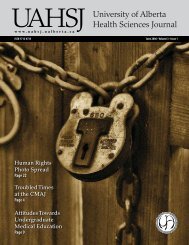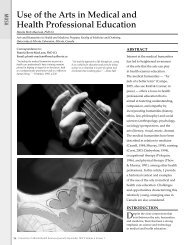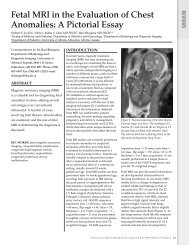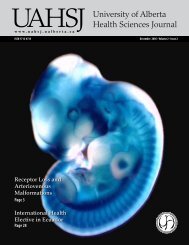Complete Issue PDF - University of Alberta Health Sciences Journal
Complete Issue PDF - University of Alberta Health Sciences Journal
Complete Issue PDF - University of Alberta Health Sciences Journal
- No tags were found...
Create successful ePaper yourself
Turn your PDF publications into a flip-book with our unique Google optimized e-Paper software.
MUSAAs <strong>of</strong>ten happens for busy clinician teachers,my schedule precluded my facilitating at thesame point in the course two years in a row,so the material discussed differed from oneyear to the next. Last year I had facilitateda small group after they watched the movieThe Doctor (1991) starring William Hurtas a callous surgeon who discovers he hascancer and must become a patient. 2 Theexperience changes the way he views hispatients, his family and his life. Although thefilm was fictional, it was based on a real-lifephysician’s memoir. This year I facilitated agroup discussion <strong>of</strong> The Doctors’ Diaries, acondensed version <strong>of</strong> the Nova documentaryseries which followed eight Harvard medicalstudents for fifteen years, from the first year<strong>of</strong> medical school, through residency, andinto practice. 3Facilitating the two groups was verydifferent. With last year’s group, thenarratives contained significant insightsabout the film The Doctor. Topics presentedin the students’ reflections included personalexperiences <strong>of</strong> illness, family support, worklifebalance, spirituality, and the concept<strong>of</strong> duty assumed upon entering a caringpr<strong>of</strong>ession. The students read descriptions<strong>of</strong> their own doctors, and also the kinds <strong>of</strong>doctors they wanted to be. Their writingstyles and abilities were varied, but theyhonoured each others’ stories, and thediscussion was very rich.Not so with this year’s group. At first, Ithought it was because <strong>of</strong> the materialused for this particular session—becauseit was a documentary, not a story, orperhaps because it was about a prestigiousivy-league school, and not “here”. Yetit was clear from the kinds <strong>of</strong> questionsand comments made during the paneldiscussion that the students had beenemotionally engaged with these real people,and threatened by the very real stresses theHarvard medical students experienced asdepicted in the film. There was somethingelse going on in my group’s session. Ishould have noted it then and put a stopto it because what was done was not whatwas intended, but I didn’t figure it out untilI myself reflected on the process for today’sworkshop.This is what happened. The first studenttook out what I thought was his writtennarrative, and instead <strong>of</strong> reading italoud, he presented his ideas in a casualconversational style as in any other groupdiscussion. When I glanced at his paper, Isaw it contained some thoughts scrawledacross the page in point format, likespeaker’s notes. Not a narrative. The nextstudent, who had written a full narrative,started to read but when she got to asentence that was similar in its theme tothe first student’s, she followed his lead andapologetically abandoned her text to wingit—“Oh, yeah, I sorta felt the same way,”and “I’ll skip that because it was the same ashe said,” and so on, essentially stripping herresponse <strong>of</strong> her individual writing style andall the personal narrative details—especiallythe careful selection <strong>of</strong> WHAT TO SAY.Those two students set the tone <strong>of</strong> thesession, and the other students followedsuit. No one read more than a fewsentences. Yes, there was a good discussionoverall, but the responses became muddledtogether, and at the end I could notidentify one distinctive story. Why had thishappened? The groups were the same sizeand equally varied in their backgroundsand experiences, we’d started with the sameintroductions process and the studentsseemed comfortable with each other.The session left me unsatisfied. I felt I hadsomehow not done my job as facilitatoralthough I wasn’t able to figure out what Ihad done wrong. I recalled the individualstudent voices from the year before intheir carefully chosen words and phrasingand compared that to the bland “Me,too”-ing <strong>of</strong> this year’s group. Even oneyoung woman who’d admitted duringthe introductions to having participatedin a poetry—yes, POETRY—group as anundergraduate, became self-conscious <strong>of</strong>her written attempts to create a voice andleft <strong>of</strong>f reading her text for the comfortable,conforming anonymity <strong>of</strong> chat.Perhaps you now can see why I havechosen to read this narrative script instead<strong>of</strong> casually discussing my experienceswith reflective writing. Writing and orallanguage are not the same. Oral language,by its speed and spontaneity, is inaccurate.We speak <strong>of</strong>f the cuff and in the moment,trying to communicate with someone whois physically present. This works becausewe have instantaneous feedback from ourcommunicative partners—in their bodylanguage, their attentiveness to the message,the quality <strong>of</strong> their response. If we’re notmaking sense, we know it—the listener asksquestions to clarify the message, and basedon these questions, we change what we aresaying—repeating, perhaps paraphrasing,altering word choice, even backtrackingor simplifying to arrive at understanding.Speech language pathologists with whomI work call this process “narrative repair.”People who are good communicators don’twait for the questions from the listenerto begin this process. They’re in there atthe first frown or lifted eyebrow, when theinternal “uh-oh” tells then they’d bettergo back and fix things, or they’ll lose theiraudience. They are already starting to pickup the pace before the increasing frequency<strong>of</strong> yawns tells them that they are beingboring. This does not happen with writtentext.In writing, the repair is in the edits andmust be done before the “speaker” ever“speaks” his piece, because any clarifyingfeedback will be removed in time and space.This forced clarification creates a powerfulcommunication tool. Spontaneous orallanguage is ephemeral, unless recorded orwritten down. We as listeners are left withan impression <strong>of</strong> someone else’s truth. Inwriting we aim to achieve our own truth.Writing should stand alone.In John Sandars’ 2009 article in MedicalTeacher he states that reflection is ametacognitive process. 4 I would add thatediting is also a metacognitive process—itrequires us to think about language, todeliberate and become deliberate in ourapproach to a communicative task. Theact <strong>of</strong> writing slows us down. We carefullyconsider the ways we use words to avoidthe possibilities for ambiguity that canambush the sought-after clarity and ultimatepresentation <strong>of</strong> our personal truth. Whenwe submit our final written draft, we are nolonger figuring out what we want to say. Weknow. We say, “THIS is what I think. THISis what I feel. THIS is what I believe.” NOT“I’ll say this about that”, but “THIS is what IWANT to say about THAT”.This is the lesson <strong>of</strong> narrative reflectivepractice, and should be our focus whenwe teach this to others: the deliberateconsideration <strong>of</strong> what we think and feel andbelieve, and the value <strong>of</strong> communicatingthese thoughts and feelings and beliefsthrough the deliberate consideration <strong>of</strong> thewritten word. The narrative reflectiveprocess was not as effective in my smallgroup this year, at least partially becauseI let the discussion stray from the writtenword. Despite the students’ emotionalengagement in The Doctor Diaries, thesuperficial conversations did not capturetheir individual reflections or link theexperience <strong>of</strong> viewing the film with theirown stories. The discussion never reacheddown to the very deep issues that had arisenfrom the film.Next year I know what to do. If any <strong>of</strong> thestudents wander away from their requestednarrative reflection, I am going to stopthem and say, “Please read what you wrote,because the words are important.”22<strong>University</strong> <strong>of</strong> <strong>Alberta</strong> <strong>Health</strong> <strong>Sciences</strong> <strong>Journal</strong> • April 2012 • Volume 7 • <strong>Issue</strong> 1






